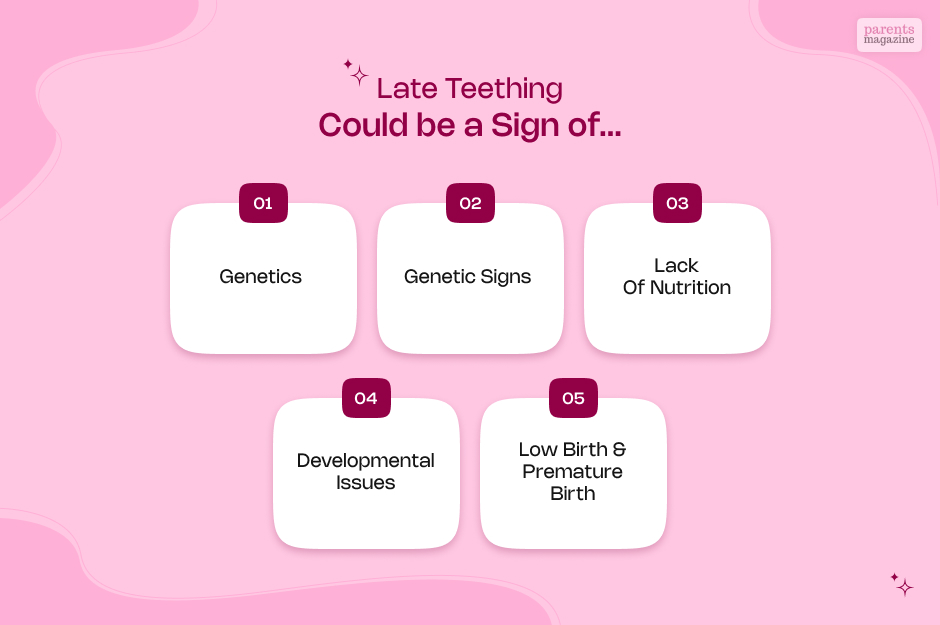
Is Late Teething Sign of Intelligence? All You Need to Know About Late Teething
Is late teething a sign of intelligence?
When your little one is growing up, you are ready to celebrate every one of his milestones. Starting from the time when they begin to crawl till the time they are ready to grab the sofa and stand up and almost ready to walk.
But teething is also another milestone most parents track. It decides when to start on solid food and prepare for baby-led weaning.
Typically, babies start to teeth around the time when they are 6 months old, and the process goes on till they are 12. This is the normal time span for teething. Teething 6 months before is called early teething. On the other hand, teething late, after 13 months, is called late teething.
So, is teething late a sign of intelligence like most people claim? How much of it is true? Here’s a blog post with all the answers you need.
Is Late Teething Sign of Intelligence?

Many people believe that late teething is a sign of intelligence. But medically, it’s often seen as a sign of developmental difficulties. In several cases, it can also indicate that your child might have ASD (autism spectrum Disorder).
However, that’s one of the many cases that can be associated with late teething. Late teething can carry several other warning signs that require close attention and proper assessment by health experts.
Typically, pediatricians and other health experts suggest that teething should start around the age of 6 to 8 months. Usually, around this time, the teeth your baby develops are called milk teeth. The reason for using this term is to denote the formula or the milk they are having during this time.
But, if they aren’t teething even after the anticipated timeframe has passed, then it can carry some warning signs. Parents of children who were diagnosed with autism at some point mentioned that their child experienced late teething. However, autism is associated with other symptoms.
An autistic child will have varying developmental timeframes for other aspects of their development as well. Their behaviors would be different and have diverse levels of development for other parts of their livelihood.
So, if your child isn’t teething until their first birthday, is it a sign of intelligence? No, not really. Yes, there’s a myth about late teething being a sign of intelligence. But there’s no medical study or theories to prove such a claim.
Your child can have higher intelligence despite being an early, on-time, or late bloomer. Their intelligence isn’t associated with teething at all.
Late Teething Could be a sign of…

So, now that you know that late teething isn’t a sign of intelligence, then does it indicate any other things? Are there any health issues that late teething suggests?
The answer is both yes and no. In some cases, late teething is a hereditary sign. When a baby is born in the lineage of people who had late teething, they are also likely to experience that.
But, if the baby is teething considerably late despite no genetic differences, then there might be different reasons for that. If you are seeing these signs in your baby, then here are a few things it may suggest –
Genetics
Late teething is a hereditary sign. If any of the blood relatives, parents, or grandparents had late teething, then it’s no surprise for your baby to also have late teeth. If something like this is the case, late teething is a hereditary sign in your child, and there’s nothing to worry about.
Genetic Signs
Your child may experience late teething due to several other genetic conditions passed down through the generations. Some conditions that cause delayed teething include – odontodysplasia, Apert syndrome, Cleidocranial dysostosis, Ellis-van Creveld syndrome, Zimmermann-Laband-1 syndrome, Hutchinson-Gilford progeria syndrome, Axenfeld Rieger, and Down’s syndrome.
Lack of Nutrition
When the baby isn’t getting enough nutrients to support its growth, it will experience a slow teething. Lack of necessary minerals, vitamins, and protein in breast milk or formula can cause your child to have teething issues.
Developmental Issues
If your child is teething late, then it can refer to different conditions like an imbalance of hormone production. There’s a condition called Hypopituitarism, which refers to the thyroid gland not producing enough hormones to support proper bodily function. This can cause your baby to start facing developmental issues.
Unproductive thyroid gland can be one of the issues associated with late teething. It can affect the body in several aspects: metabolism, body regulations, and several other aspects of development. Hypopituitarism is a pituitary gland condition causing children to experience delayed growth. It can also result in slow teething.
Low Birth & Premature Birth
If a baby has gone through premature birth or was underweight during birth, it is most likely for them to face developmental issues. Due to premature birth, a baby has to spend their last month outside the mother’s womb. It can cause them to have delayed teething.
What Are the Risks Related to Late Teething?

Some people believe that babies not teething below the age of 12 months have some serious health issues and they need to seek medical help. On the other hand, some parents think that late teething is a sign of intelligence.
It doesn’t apply in either case. Late teething doesn’t mean your child is going to be super intelligent. It also doesn’t suggest that your child has some health issues.
However, under specific conditions, there should be some health concerns related to late teething. It’s important to maintain the following practices to keep your child safe from other health issues –
- Maintain regular dental visits to keep your baby safe from any dental and oral health issues from happening. Also, children with late teething have the chance to develop orthodontic care in childhood. It can also come during their adulthood.
- However, these aren’t of any serious concern since most children (around 80%) would require orthodontic care when they approach adulthood.
In most cases, delayed teething doesn’t cause any risk to the development of a child’s overall health. There’s no permanent side effect one has to worry about when a child has late teething.
Are There Benefits to Late Teething?

There are several benefits to late teething, and certain studies have proved some of these benefits.
- Late teething can often help a child develop better cognitively. Delayed eruption of teeth allows a child to mature its jaw and helps create a better facial structure. It can better affect their cognitive abilities as they grow up.
- Children who are teething a bit later than others have a higher chance of having stronger and better teeth. Their teeth become stronger, and the enamel takes a longer time to mature and mineralize.
- Children have more time to build their oral motor abilities with longer teething time. These are essential for producing speech when they speak.
- Less Teething Pain: Babies teething later tend to have mild teething pain when they finally start teething.
- Extended period for breastfeeding: Children who are teething later in life have prolonged periods of breastfeeding. This helps to develop their health while also strengthening their bond with their mother.
When to See a Dentist?
As per the American Dental Association, children get their first dental appointment when they are 12 months of age. Or, it can be done when a child has their first teeth coming out. Although it’s common for many parents not to visit the doctors when the first teeth come out, it’s best to visit the dentist when the child is 18 months of age.
They check out the baby’s teeth with an X-ray and help you learn if there are any problems you should concern yourself with. So, if you were wondering if late teething is a sign of intelligence, then it’s not true. Hopefully, you have found your answer.
You May Also Like To Read:
Already have an account?
Sign In
Create your account
User added successfully. Log in








